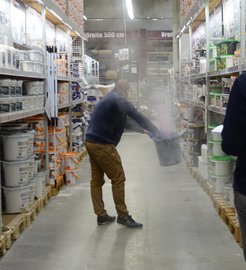COVID-19 transmission: Large indoor-spaces fairly safe with universal masking
The risk of COVID-19 infection in large indoor spaces such as hardware stores is low if everyone wears a face mask.
A study by the Max Planck Institute for Dynamics and Self-Organization (MPI-DS) found the risk of airborne infection in large indoor spaces such as hardware stores comparable to outdoors. Even when the number of customers is within the typical capacity for hardware stores, such facilities are safe for customers as long as certified face masks are worn. These results are expected to be transferable also to other large indoor spaces.
Determining the risk of COVID-19 infection in everyday situations has become an important consideration for many people in their daily decision-making. In this context, the effectiveness of wearing filtering face masks and regular testing has been demonstrated. A new study from the team of Eberhard Bodenschatz at the Max Planck Institute for Dynamics and Self-Organization now investigated the infection risk in large indoor spaces. Using measurements in two different hardware stores, they found that even with a typical average customer occupancy of one person per 25 m², the exhaled aerosols from infected people in the room practically do not increase the risk of infection. Predominantly, this risk originates from direct contact and interaction between people

"We used particles of different sizes similar to the aerosols exhaled by people, which are known to remain in the air for a long time. In our experiments, we measured their distribution and decay at different locations in the shops," says Eberhard Bodenschatz explaining the experimental setup. "Our data show very short residence times and rapid decay for these aerosols, regardless of the particle size measured," he adds.
In the hardware store salesroom, the decay time of the aerosols was found to be about 1-2 minutes. To determine a person's risk of infection, the researchers calculated a maximum value as an upper bound for infection, similar to their recent study on the effectiveness of FFP2 masks. In this, assuming a 7-day incidence rate of 2,000 new infections per 100,000 households, the risk of infection is statistically only about 3%, similar to an outdoor situation.
"All in all, we found that the accumulation of aerosols in large indoor environments such as hardware stores is negligible for the risk of infection," summarizes Bardia Hejazi, lead author of the study. "This suggests that such spaces are safe places as long as everyone wears a certified filter mask," comments Bodenschatz. Group leader Mohsen Bagheri, leading scientist of the study along with Bodenschatz, adds: "If everyone wears an FFP2 mask or a surgical mask, the length of stay for each client is not unreasonably long and staff are tested regularly, the likelihood of infection is extremely low in such indoor spaces."
